This post may contain affiliate links. Please read our disclosure policy.
Homemade Butternut Squash Ravioli with Brown Butter Sage Sauce, made with pasta dough from scratch and roasted garlic and butternut, tastes like heaven.
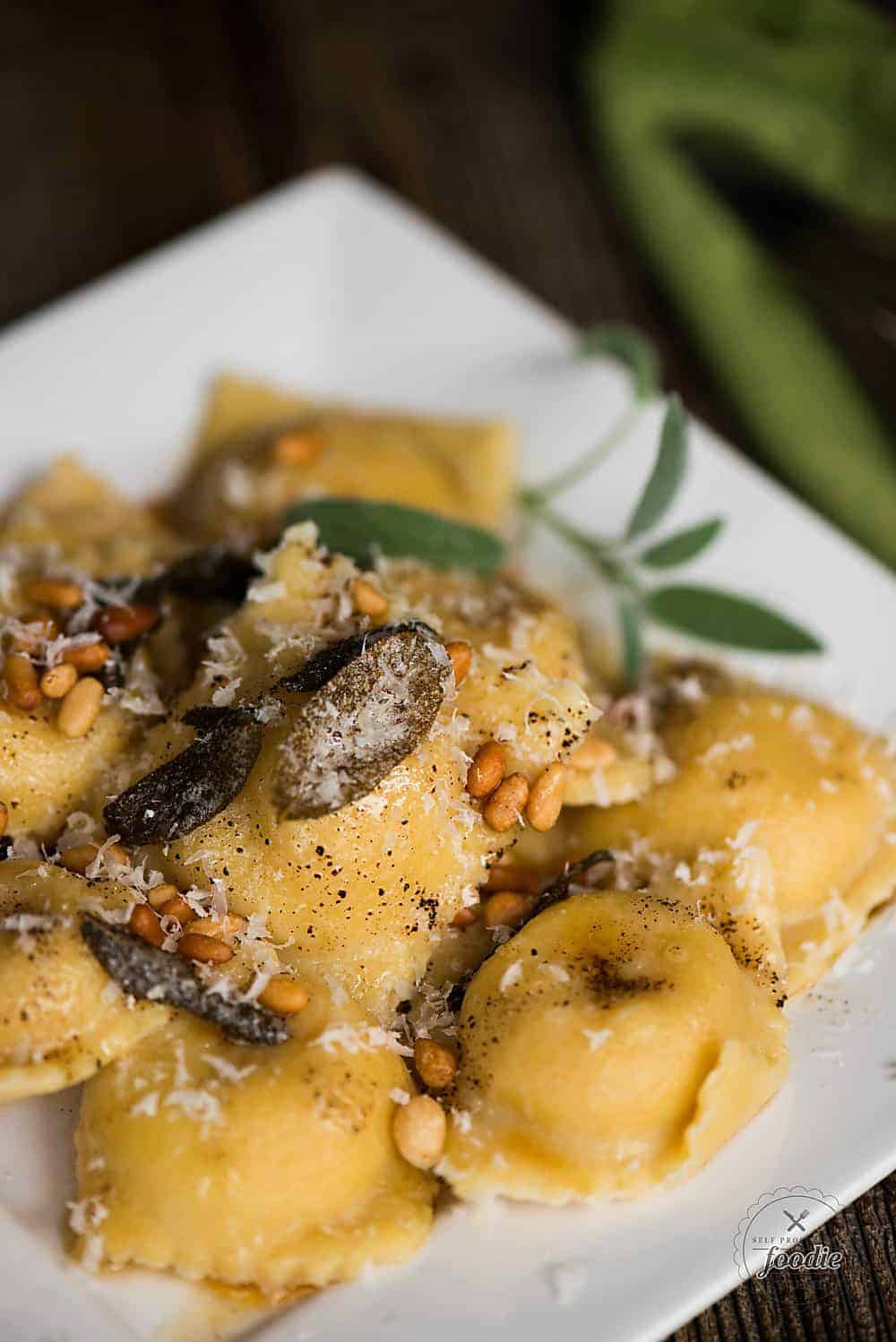
Why this recipe works
Homemade Butternut Squash Ravioli with Brown Butter Sage Sauce – it’s like fall perfection on a plate. In fact, it’s one of my favorite pasta recipes.
- Roasting butternut squash is so easy to make. Once you roast butternut squash with whole cloves of garlic, you’ll never go back. Pure heaven, I tell you!
- Homemade pasta is actually super simply to make and the taste and texture can’t be beat. My pasta recipe works perfectly for this ravioli.
- And let’s not forget the brown butter sage sauce. You know I love my brown butter, and it is perfect for savory dishes like this butternut squash ravioli too. This homemade ravioli has so much flavor, but it requires the perfect sauce to compliment it rather than over power it.
How to Make Homemade Butternut Ravioli
In my opinion, there are three necessary pieces of equipment: a stand mixer with a dough hook, a pasta roller, and a ravioli maker. These are amazon links to the exact products I use. Now, you certainly don’t need all of this equipment and people have been making pasta by hand for centuries, but if you have them, making pasta is a breeze.
- Prepare the filling. This is done by coating butternut squash and garlic cloves in olive oil and roasting on a baking sheet (photo 1). This gets pureed in a food processor with additional olive oil, parmesan cheese, dried sage, and salt and pepper (photo 2).
- Make the sauce. Butter and fresh sage are cooked over low heat until the butter is browned and the sage is infused (photo 3). This is to be done just prior to serving.
- Make the pasta. Equal parts of all-purpose and semolina flour are combined with eggs, olive oil, water and salt, then kneaded until elastic. After a period of rest, the dough gets rolled into sheets.
- Assemble the ravioli. Cover the ravioli mold with the pasta dough, create a well for the filling, and add about a heaping teaspoon of roasted garlic butternut squash filling to each well (photo 4). Cover with the second sheet of dough (photo 5) and gently roll the dough together to cut the pieces. Then, all you have to do is turn it over, give it a tap, and they all fall out (photo 6). Easy!
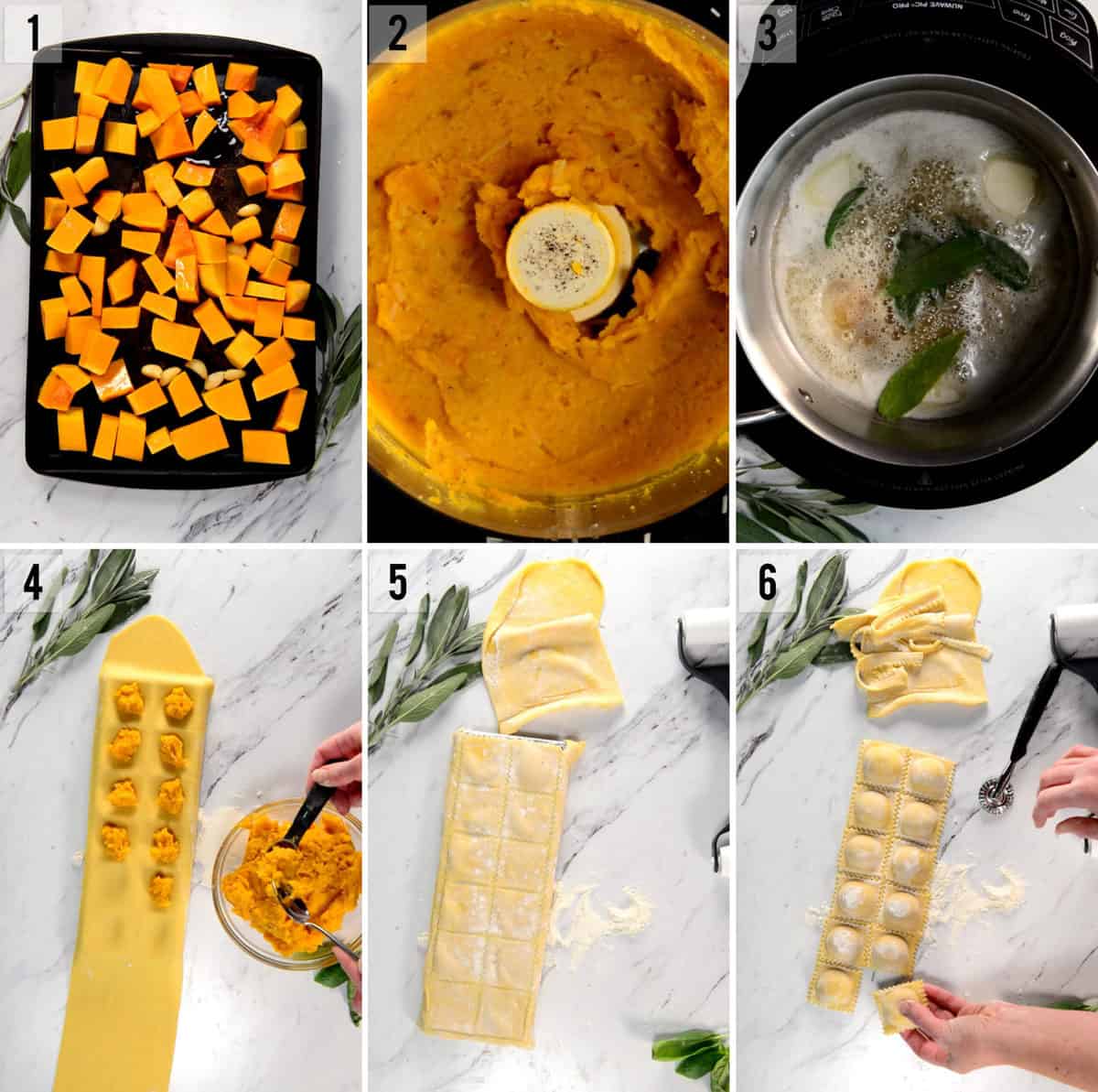
Recipe Tips
- To cook: toss the ravioli in salted boiling water for just a few minutes until they float.
- To freeze: line a baking sheet with parchment paper and add a single layer of the homemade ravioli. Set in freezer and once completely frozen, they can be added to a resealable plastic bag. Be sure to squeeze out as much air as possible to prevent freezer burn.
- Making the pasta: I prefer an even mix of semolina flour to all-purpose flour. It gives the pasta great texture and chew, plus it’s insanely easy to work with. The addition of olive oil to the dough can be tasted in the final pasta – YUM! You must kneed your pasta dough for a solid ten minutes. If you want to do this by hand, more power to you, but pasta dough is not a soft dough like bread dough, so you’re in for a workout. I highly recommend using your Kitchenaid mixer. You have to be sure to cover the dough and allow it to rest. This process allows the gluten to do whatever gluten does to make pasta wonderful.
- To roll out the sheets of pasta dough to make your homemade ravioli, you can roll it on the counter by hand, but I highly recommend using a pasta roller. I’ve used the KitchenAid pasta attachments before, and while they certainly are easy to use, there is something so satisfying about rolling pasta dough in a quality made in Italy pasta roller. Just be sure you use enough flour to avoid any sticking in your pasta machine.
- When forming the ravioli, be sure to have floured all of your dough generously so that it releases easily from the mold.
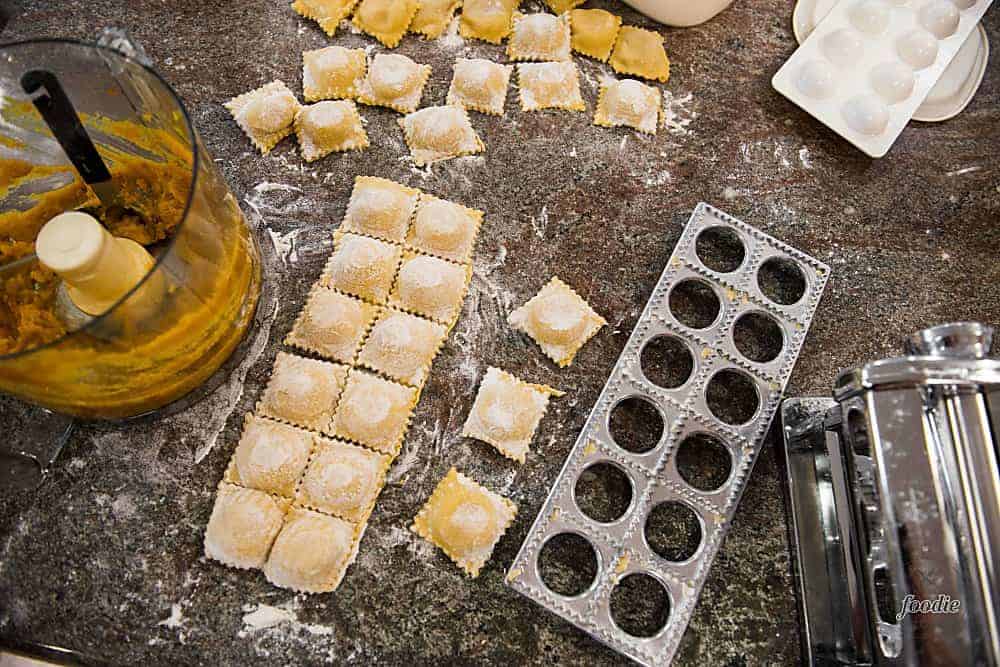
Other Great Ravioli and Pasta Recipes
Once you make your own homemade pasta, you’ll want to find every recipe that you can that uses it. Here are some of my favorites!
- Four Cheese Ravioli
- Meat and Cheese Ravioli
- The BEST Classic Homemade Lasagna Recipe
- Butternut Squash Lasagna
- Roasted Vegetable Lasagna
- Green Chile Chicken Lasagna
- Shrimp Cajun Pasta
- Ham and Pea Pasta Carbonara
- Homemade Alfredo Sauce Recipe
- Easy Bolognese Sauce
- Roasted Red Pepper Sauce
- Chicken Alfredo Lasagna
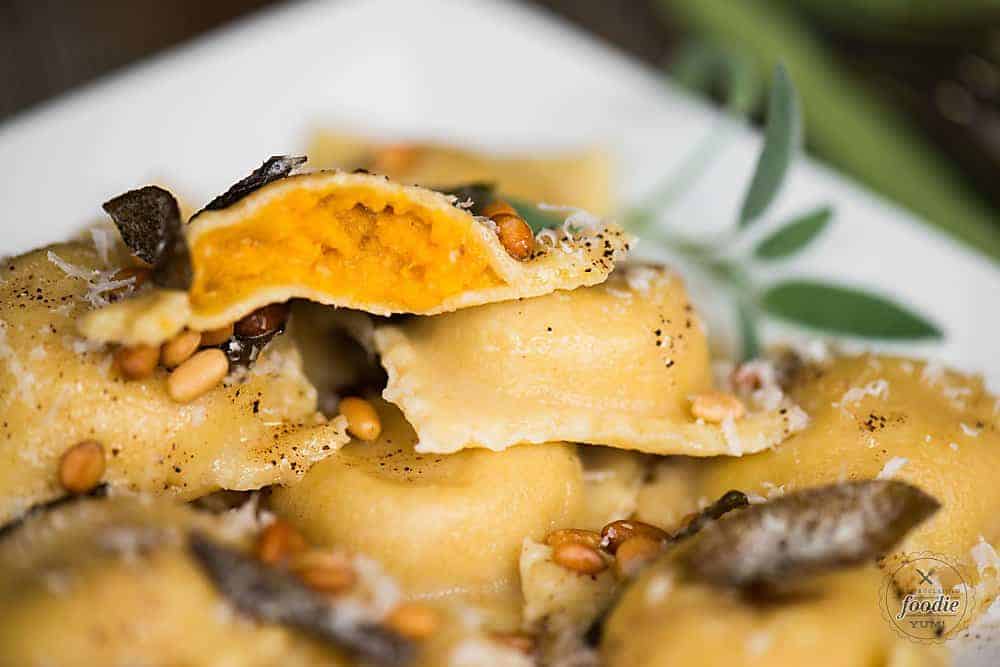
Pin this now to save it for later
Pin ItButternut Squash Ravioli
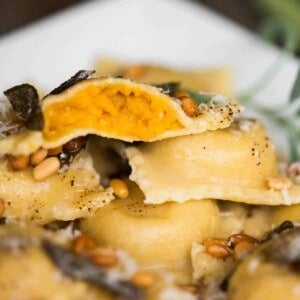
Ingredients
Pasta
- 1 1/2 cups Semolina Pasta Flour
- 1 1/2 cups all-purpose Flour
- 4 whole eggs
- 4 tablespoons olive oil
- 4 tablespoons water
- 1 teaspoon kosher salt
Filling
- 2 1/2 lbs butternut squash peeled and roughly chopped
- 8 whole garlic cloves
- 1/4 cup olive oil
- 1/2 cup parmesan cheese
- 1/2 teaspoon dried sage
- salt and pepper to taste
Sauce & garnish (see notes below)
- 4 tablespoons butter (1/2 stick)
- 10 whole fresh sage leaves
- Garnish with 1/4 cup toasted pine nuts and freshly grated parmesan cheese
Instructions
To make the pasta dough:
- Combine all pasta ingredients and mix together to make a stiff dough. Knead by hand or in a stand mixer with the dough hook on medium low speed for 10 minutes or until dough is elastic. Wrap dough in plastic wrap and let rest for at least 20 minutes. On a lightly floured surface roll out to desired thickness and cut as desired.1 1/2 cups Semolina Pasta Flour, 1 1/2 cups all-purpose Flour, 4 whole eggs, 4 tablespoons olive oil, 4 tablespoons water, 1 teaspoon kosher salt
To make the filling:
- Toss the 2 1/2 lbs butternut squash with the 8 whole garlic cloves in a bowl with just enough olive oil to evenly coat everything. Roast on a baking sheet at 400°F for about 45 minutes until soft. Remove from the oven and mix in a food processor to combine – slowly pouring additional olive oil into the mixture until the consistency is smooth. Add 1/2 cup parmesan cheese, 1/2 teaspoon dried sage, and salt and pepper, to taste. Use this filling to make the ravioli.
To make the sauce:
- Combine 4 tablespoons butter and 10 whole fresh sage leaves in small sauce pan. Heat over low heat for at least 15 minutes to infuse the butter. Then, increase the heat just a bit (take care not to burn) and stir continuously until the butter browns slightly and the sage leaves crisp.
To prepare:
- Use a ravioli press to add and seal one teaspoon of filling in between each pasta sheet. Dip finger in water and wet edges of pasta before adding second sheet to allow for a nicely sealed ravioli. Use a roller, gently pressing down, to seal them up. Be sure to heavily flour the outside of your pasta to enable easy release.
- Boil the ravioli in plenty of salted water until just done. This will only take a short time! The ravioli will float on the surface of the water when they are finished. Carefully remove and drain. Serve with sage butter, a 1/4 cup toasted pine nuts, and a generous amount of freshly grated Parmesan cheese.
Notes
- To cook: toss the ravioli in salted boiling water for just a few minutes until they float.
- To freeze: line a baking sheet with parchment paper and add a single layer of the homemade ravioli. Set in freezer and once completely frozen, they can be added to a resealable plastic bag. Be sure to squeeze out as much air as possible to prevent freezer burn.
- Making the pasta: I prefer an even mix of semolina flour to all-purpose flour. It gives the pasta great texture and chew, plus it’s insanely easy to work with. The addition of olive oil to the dough can be tasted in the final pasta – YUM! You must kneed your pasta dough for a solid ten minutes. If you want to do this by hand, more power to you, but pasta dough is not a soft dough like bread dough, so you’re in for a workout. I highly recommend using your Kitchenaid mixer. You have to be sure to cover the dough and allow it to rest. This process allows the gluten to do whatever gluten does to make pasta wonderful.
- To roll out the sheets of pasta dough to make your homemade ravioli, you can roll it on the counter by hand, but I highly recommend using a pasta roller. I’ve used the KitchenAid pasta attachments before, and while they certainly are easy to use, there is something so satisfying about rolling pasta dough in a quality made in Italy pasta roller. Just be sure you use enough flour to avoid any sticking in your pasta machine.
- When forming the ravioli, be sure to have floured all of your dough generously so that it releases easily from the mold.
- Sauce amount – Since I typically don’t cook all of these ravioli (I cook some and freeze the rest), the amount of sauce in this recipe is perfect for my family of four. If you’re planning on cooking ALL of the ravioli at the same time, you may want to double or triple the sauce amount.
Video
Nutrition
Nutrition information is automatically calculated, so should only be used as an approximation.
This recipe was originally published in November 2017 and has been updated with helpful information, ingredient and process photos, as well as recipe tips. Don’t worry – the recipe hasn’t changed!

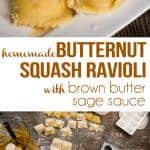


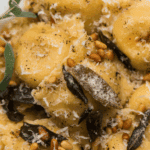

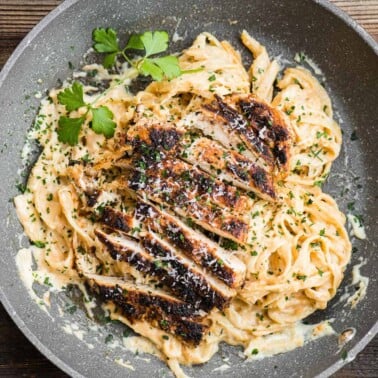
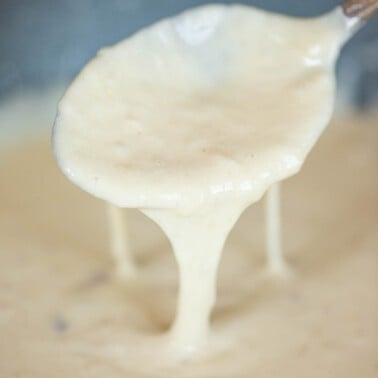
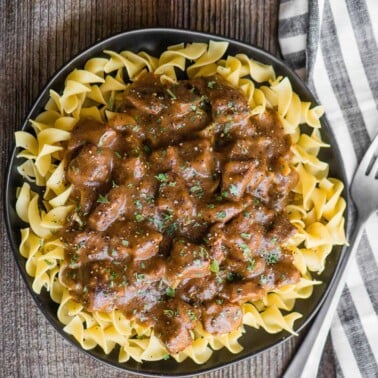
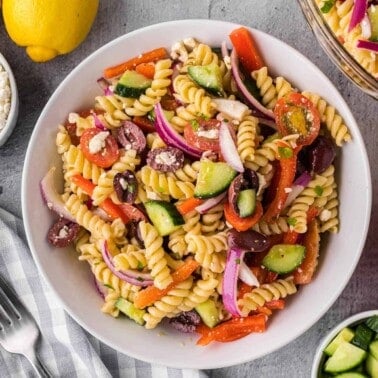









Just delicious and not that hard to make. The ravioli are sweet tasting and the brown butter sage is a delicious compliment.
I had purchased my ravioli from the store so I used the brown butter sage sauce. It was excellent! Maybe one day I will try to do the full recipe but for a quick sauce with store bought ravioli it is fantastic!
If I don’t have semolina flour, can I use just all purpose?
You totally can, but I personally don’t like pasta that is only made with all purpose flour. I’ve made it before in a cooking class and found it to taste doughy. I love the bite semolina adds. I always have it on hand because I use it when I make pizza and English muffins as well.
When I visited Italy a few years back my cousin told me to use Farina (Caputo, Chef’s Flour, Tipo “00”) instead of semolina. If I have it I use it. If not semolina works fine. I don’t use any All purpose flour.
I don’t have sage leaves. How much ground sage would I use in place of the leaves?
Start with small amounts, like 1/4 teaspoon, and taste the filling. Increase until it tastes good to you.
Absolutely fantastic! We made it theee times in one week.
Is the brown butter sauce here enough for all 6 dozen ravioli or is it for a certain number of servings?
Great question and I’ll update the recipe… This makes so many ravioli that I usually freeze at least half. The sauce makes enough for my family of four so if you want to make enough for ALL of the ravioli, you’ll probably have to make more sauce. It also depends on how much brown butter you want to coat them. Hope that helps!
Hi,
Why did my filling stay kind of water, not thick enough?
Thanks
G
Perhaps it didn’t roast long enough?
This is the first time I made ravioli and it was a hit! I made extra of the stuffing mixture because I had extra butternut squash I needed to use. I froze the filling and then just this week I made dough and thawed the filling and it worked perfectly!
Hello,
Do I have to cube up the butternut squash or can I roast it whole?
You can roast it whole. You just want it to be very soft.
I made it with whole wheat flour and a bit of sour dough starter instead of water. I loved it even though my pasta was a little unconventional. I am sure it would be amazing too with all purpose and made as she suggested. I also just baked my butternut squash whole then scooped out the seeds. It was easy!